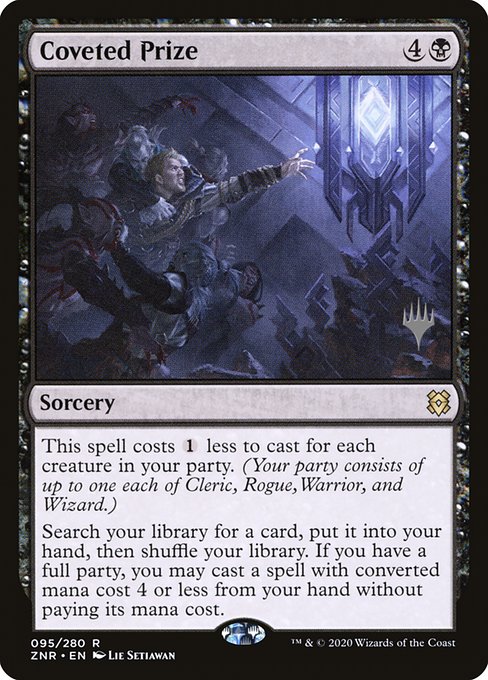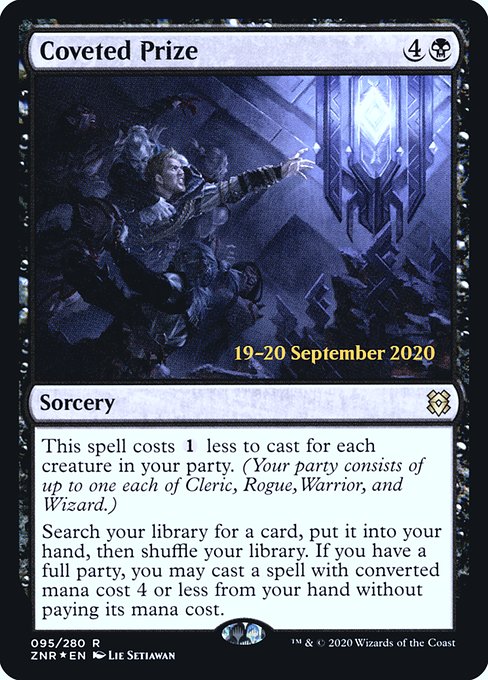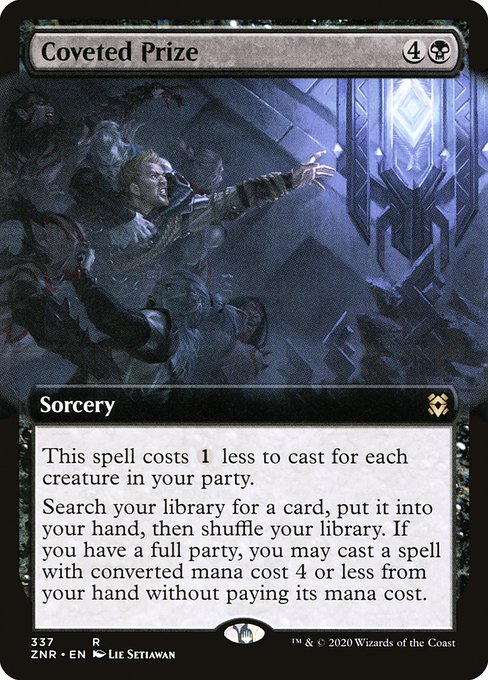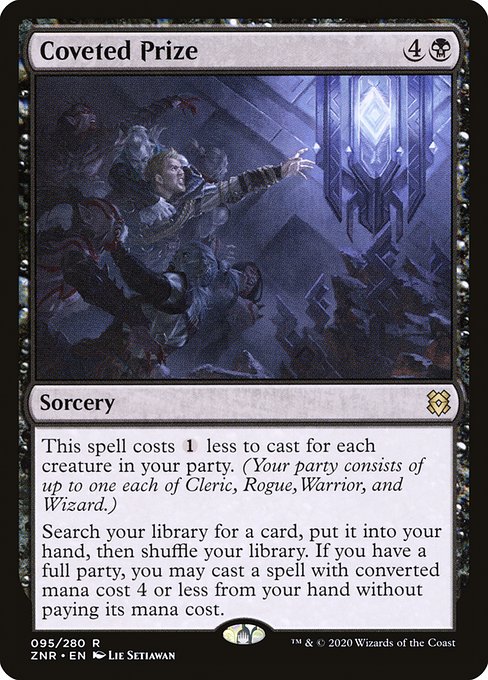Coveted Prize
Sorcery
This spell costs less to cast for each creature in your party. (Your party consists of up to one each of Cleric, Rogue, Warrior, and Wizard.)
Search your library for a card, put it into your hand, then shuffle. If you have a full party, you may cast a spell with mana value 4 or less from your hand without paying its mana cost.
Search your library for a card, put it into your hand, then shuffle. If you have a full party, you may cast a spell with mana value 4 or less from your hand without paying its mana cost.
standard
future
historic
gladiator
pioneer
explorer
modern
legacy
pauper
vintage
penny
commander
brawl
alchemy
paupercommander
duel
oldschool
premodern
Rulings
Several cards have a cost reduction based on the number of creatures in your party. To determine the total cost of a spell, start with the mana cost or alternative cost you’re paying, add any cost increases, then apply any cost reductions. The converted mana cost of the spell is determined only by its mana cost, no matter what the total cost to cast the spell was.
Some cards refer to you having a “full party.” This is true if the number of creatures in your party is four.
If a creature has more than one party creature type, and there are multiple ways to count that creature that could result in a different number of creatures in your party, the highest such number is used. For example, if you control a Cleric and a Cleric Wizard, the number of creatures in your party is two. You can’t choose to have it be just one by counting the Cleric Wizard first as a Cleric.
If you cast a card “without paying its mana cost,” you can’t choose to cast it for any alternative costs. You can, however, pay additional costs. If the card has any mandatory additional costs, you must pay those to cast the card.
If you have a full party and wish to cast a spell with Coveted Prize’s effect, you do so as part of the resolution of Coveted Prize after searching for a card. You can’t wait to cast it later in the turn. Timing permissions based on a card’s type are ignored.
If a spell has a cost reduction based on the number of creatures in your party, no player may attempt to change that number after you begin to cast the spell but before you pay the cost.
An ability referring to the number of creatures in your party gets a number from zero to four. Such abilities never ask which creatures are in your party, and you never have to designate specific creatures as being in your party. You can’t choose to exclude creatures from this count to lower the number.
The card you search for may be the one you cast.
To determine “the number of creatures in your party,” check whether you control a Cleric, whether you control a Rogue, whether you control a Warrior, and whether you control a Wizard. The number is the total number of those checks to which you answered yes. Each creature you control can be counted for only one of those checks.
If the card has in its mana cost, you must choose 0 as the value of X when casting it without paying its mana cost.
Some cards refer to you having a “full party.” This is true if the number of creatures in your party is four.
If a creature has more than one party creature type, and there are multiple ways to count that creature that could result in a different number of creatures in your party, the highest such number is used. For example, if you control a Cleric and a Cleric Wizard, the number of creatures in your party is two. You can’t choose to have it be just one by counting the Cleric Wizard first as a Cleric.
If you cast a card “without paying its mana cost,” you can’t choose to cast it for any alternative costs. You can, however, pay additional costs. If the card has any mandatory additional costs, you must pay those to cast the card.
If you have a full party and wish to cast a spell with Coveted Prize’s effect, you do so as part of the resolution of Coveted Prize after searching for a card. You can’t wait to cast it later in the turn. Timing permissions based on a card’s type are ignored.
If a spell has a cost reduction based on the number of creatures in your party, no player may attempt to change that number after you begin to cast the spell but before you pay the cost.
An ability referring to the number of creatures in your party gets a number from zero to four. Such abilities never ask which creatures are in your party, and you never have to designate specific creatures as being in your party. You can’t choose to exclude creatures from this count to lower the number.
The card you search for may be the one you cast.
To determine “the number of creatures in your party,” check whether you control a Cleric, whether you control a Rogue, whether you control a Warrior, and whether you control a Wizard. The number is the total number of those checks to which you answered yes. Each creature you control can be counted for only one of those checks.
If the card has in its mana cost, you must choose 0 as the value of X when casting it without paying its mana cost.
Rulings
Several cards have a cost reduction based on the number of creatures in your party. To determine the total cost of a spell, start with the mana cost or alternative cost you’re paying, add any cost increases, then apply any cost reductions. The converted mana cost of the spell is determined only by its mana cost, no matter what the total cost to cast the spell was.
Some cards refer to you having a “full party.” This is true if the number of creatures in your party is four.
If a creature has more than one party creature type, and there are multiple ways to count that creature that could result in a different number of creatures in your party, the highest such number is used. For example, if you control a Cleric and a Cleric Wizard, the number of creatures in your party is two. You can’t choose to have it be just one by counting the Cleric Wizard first as a Cleric.
If you cast a card “without paying its mana cost,” you can’t choose to cast it for any alternative costs. You can, however, pay additional costs. If the card has any mandatory additional costs, you must pay those to cast the card.
If you have a full party and wish to cast a spell with Coveted Prize’s effect, you do so as part of the resolution of Coveted Prize after searching for a card. You can’t wait to cast it later in the turn. Timing permissions based on a card’s type are ignored.
If a spell has a cost reduction based on the number of creatures in your party, no player may attempt to change that number after you begin to cast the spell but before you pay the cost.
An ability referring to the number of creatures in your party gets a number from zero to four. Such abilities never ask which creatures are in your party, and you never have to designate specific creatures as being in your party. You can’t choose to exclude creatures from this count to lower the number.
The card you search for may be the one you cast.
To determine “the number of creatures in your party,” check whether you control a Cleric, whether you control a Rogue, whether you control a Warrior, and whether you control a Wizard. The number is the total number of those checks to which you answered yes. Each creature you control can be counted for only one of those checks.
If the card has in its mana cost, you must choose 0 as the value of X when casting it without paying its mana cost.
Some cards refer to you having a “full party.” This is true if the number of creatures in your party is four.
If a creature has more than one party creature type, and there are multiple ways to count that creature that could result in a different number of creatures in your party, the highest such number is used. For example, if you control a Cleric and a Cleric Wizard, the number of creatures in your party is two. You can’t choose to have it be just one by counting the Cleric Wizard first as a Cleric.
If you cast a card “without paying its mana cost,” you can’t choose to cast it for any alternative costs. You can, however, pay additional costs. If the card has any mandatory additional costs, you must pay those to cast the card.
If you have a full party and wish to cast a spell with Coveted Prize’s effect, you do so as part of the resolution of Coveted Prize after searching for a card. You can’t wait to cast it later in the turn. Timing permissions based on a card’s type are ignored.
If a spell has a cost reduction based on the number of creatures in your party, no player may attempt to change that number after you begin to cast the spell but before you pay the cost.
An ability referring to the number of creatures in your party gets a number from zero to four. Such abilities never ask which creatures are in your party, and you never have to designate specific creatures as being in your party. You can’t choose to exclude creatures from this count to lower the number.
The card you search for may be the one you cast.
To determine “the number of creatures in your party,” check whether you control a Cleric, whether you control a Rogue, whether you control a Warrior, and whether you control a Wizard. The number is the total number of those checks to which you answered yes. Each creature you control can be counted for only one of those checks.
If the card has in its mana cost, you must choose 0 as the value of X when casting it without paying its mana cost.
Your collection? Your decks?
Want to manage your collection and/or create decks?


 0
0
 0.17€
0.17€


